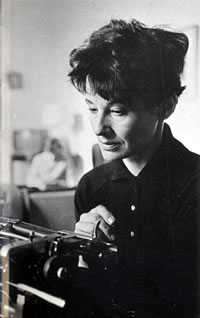There is much to know about Penelope Mortimer. She was married to one man, but gave birth to two children from extramarital affairs with two other, separate men. While pregnant, she would leave her first husband for her second, John Mortimer. Their relationship was anything but sunny, and the details became excellent source material for her scathingly brilliant novels, of which The Pumpkin Eater stands out. The Pumpkin Eater deals with the slow burn of betrayal, the collapse of trust, the tribulations of reproduction and parenting, and the devastating isolation and depression that plagued women's domestic lives in the 1950s and 60s. It was made into a popular film in 1964 starring Anne Bancroft and Peter Finch with a screenplay by Harold Pinter. Published a year before feminist classics such as The Feminine Mystique and Sylvia Plath's The Bell Jar, The Pumpkin Eater is a revelation. With its unrelenting honesty and gallows humor, it's unbelievable that the novel could have ever lapsed into the shadows. Thankfully, it has been reissued under the aegis of the New York Review Books.
In addition to her contributions to fiction (nine novels, two short-story collections), Mortimer was the author of a controversial biography of the Queen Mother, an advice columnist for The Daily Mail, the movie critic for The Observer, and a regular contributor to The New Yorker. She was also a mother to six children. She would go on to write a three-volume memoir About Time—though the third volume remains, sadly, unpublished. Mortimer lived to the age of 81, continuing to write at her cottage in the Cotswolds. As Daphne Merkin quotes in her NYRB introduction to The Pumpkin Eater, "Owning land," Mortimer recorded in her memoir, "made some stubbornly preserved part of me emerge rampant, sweeping the rest out of sight.”
From The Pumpkin Eater (1962):
I wanted to go home, but now my father was dead there was no home to go to, only a house where my mother mourned and thanked goodness that I had at last seen reason. Jake told me that he heard that Conway was roaming London blind drunk. I knew this, because for a week after our meeting he had rung me every day with such vile punishment that now I never answered the telephone, and if I was alone in the house I took the receiver off the hook. I began drinking because the thought that I was drinking gave me a kind of identity: each time I poured myself a brandy in the afternoon I could say to myself "I am a woman who drinks." It was the positive action rather than the brandy itself that gave me courage. By tea-time I could sit at the head of the table and listen calmly enough to the children, even though I could not understand them. They roistered like billeted troops, cramming themselves with bread and chocolate, swigging great mugs of milk and sweetened tea, miraculously innocent, strong, indifferent. The thought of this half ton of hungry, growing, sentient body and brain coming from my body should, perhaps, have satisfied me. In fact, lacking now my own instincts, values and beliefs, I had nothing to offer them, and what they offered me—dependence, love, trust—seemed a monumental responsibility which I could no longer bear.
